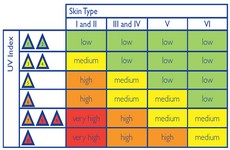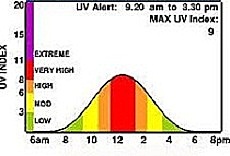Information: Ultraviolet (UV) Index





UV Index
The Ultraviolet Index or UV Index is an international standard measurement of the strength of the ultraviolet (UV) radiation from the sun at a particular place on a particular day.
It is a scale primarily used in daily forecasts aimed at the general public. The UV index is a linear scale, with higher values representing the risk level of skin damage due to UV exposure.
An index of 0 corresponds to zero UV irradiation, as is essentially the case at nighttime. While an index of 10 corresponds roughly to midday sun and a clear sky, indices greater than 11 are quite common in the southern hemisphere. The numbers are related to the amount of UV radiation reaching the surface of the earth, measured in W/m².
This page gives an overview of the effects and precautions in regards to UV Index numbers in the uk. The Data is based on information collected from cancer research and the met office.
What to do for UV Protection?
When you are out in the sun, wear clothing to protect as much skin as possible.
Use sunscreen with a sun protection factor (SPF) of at least 30. The SPF number indicates protection against UV.
Another way to limit exposure to UV light is to avoid being outdoors in sunlight too long. UV rays are strongest when the sun is high in the sky, usually between the hours of 10 am and 4 pm. If you are unsure about the sun's intensity, use the shadow test: if your shadow is shorter than you, the sun's rays are the strongest, and protection from the sun is most important.
UV-blocking sunglasses are important for protecting the delicate skin around the eyes, as well as the eyes themselves.
When is UV Protection needed?
You should generally be careful between late spring and early autumn when the sun's rays are most intense.
Little UV radiation reaches the Earth during early morning or late afternoon hours. But during the four-hour period around solar noon UV levels can be very high.
Make sure you protect yourself against UV when you go skiing, do water sports or spend extended time on the beach.
Spending a whole day out in the open exposes you to a lot of UV radiation, especially under conditions of strong ground reflection.
Why to protect against UV irradiation?
Because solar UV-radiation represents the most important environmental risk factor for the development of non-melanoma skin cancer, UV protection is important to prevent these malignancies.
The recommendations given are for adults with pale to lightly tan skin.
Children and particularly fair-skinned people or those who have sun sensitivity for medical reasons need to take extra precautions.
The Good Side...
UV from the Sun is needed by our bodies to produce vitamin D. Vitamin D helps strengthen bones, muscles and the bodys immune system.
UV is used in the treatment of skin conditions such as psoriasis.
Research suggests that sunlight stimulates the pineal gland in the brain to produce certain chemicals called tryptamines. These chemicals improve our mood.
